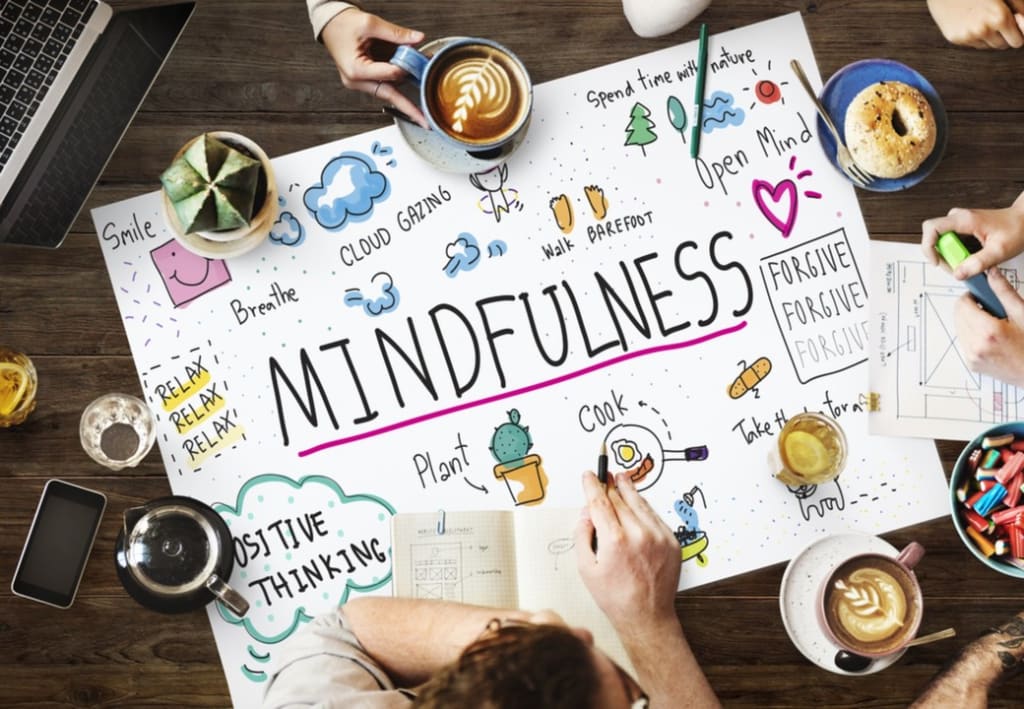The Art of Mindful Living: Cultivating Peace and Happiness in a Busy World
Discover the Power of Mindfulness to Reduce Stress, Improve Mental Health, and Enhance Your Quality of Life

In today's fast-paced world, it is easy to get caught up in the hustle and bustle of everyday life. We often find ourselves multitasking, constantly connected to technology, and feeling overwhelmed by the never-ending demands of work and personal life. In the midst of all this chaos, we may forget to take a moment to pause and reflect on our inner world, leading to stress, anxiety, and burnout. This is where mindfulness comes in. Mindfulness is the practice of paying attention to the present moment, non-judgmentally, and with an open mind. It is a powerful tool that can help us cultivate peace and well-being in our lives. In this blog, we will explore the benefits of mindfulness and how you can incorporate it into your daily routine.
Mindfulness has been scientifically proven to improve mental and physical health. Studies have shown that regular mindfulness practice can reduce stress, anxiety, and depression, improve sleep quality, boost immunity, and increase overall well-being. Mindfulness also improves cognitive function, including attention, memory, and decision-making. It can help us manage our emotions and increase our capacity for empathy and compassion.
So, how can you incorporate mindfulness into your daily routine? Here are a few tips:
Start your day with mindfulness. When you wake up in the morning, take a few deep breaths and set an intention for the day. Focus on the present moment and let go of any worries or distractions.
Practice mindful breathing. Take a few minutes throughout the day to focus on your breath. Notice the sensations of the breath moving in and out of your body. If your mind wanders, gently bring your attention back to your breath.
Practice mindful eating. Take the time to savor your food, noticing the textures, flavors, and smells. Eat slowly and mindfully, without distractions such as phones or TVs.
Practice mindful movement. Whether it's yoga, walking, or any other form of exercise, pay attention to your body and your surroundings. Notice the sensations in your body and the sights and sounds around you.
Take a mindful break. Throughout the day, take a few moments to pause and check in with yourself. Take a few deep breaths and notice how you are feeling.
Incorporating mindfulness into your daily routine may take some practice, but it is worth the effort. It can help you cultivate peace and well-being in your life, improve your mental and physical health, and enhance your overall quality of life. So, take a few moments each day to be present, to breathe, and to connect with your inner world. You'll be amazed at the positive impact it can have on your life.
Mindfulness is the practice of being present and aware of one's thoughts, feelings, and surroundings in a non-judgmental way. It involves intentionally paying attention to the present moment, without distraction or judgement, and accepting things as they are.
The practice of mindfulness can take many forms, including meditation, breathing exercises, yoga, and mindful movement. It can also be practiced in everyday activities, such as eating, walking, and even washing dishes. The goal of mindfulness is to cultivate a state of awareness that helps us to be more engaged in the present moment, rather than being caught up in worries about the past or future.
The benefits of mindfulness are many and varied, including reducing stress and anxiety, improving sleep quality, enhancing cognitive function, boosting the immune system, and increasing overall well-being. It can also help us to develop a greater sense of compassion, both for ourselves and others.
Mindfulness is rooted in ancient spiritual traditions, particularly Buddhism, but it has become increasingly popular in recent years as a secular practice. Many scientific studies have investigated the effects of mindfulness, and it is now recognized as a valid approach to improving mental and physical health.
If you're interested in practicing mindfulness, there are many resources available, including books, apps, and classes. It's important to remember that mindfulness is a skill that requires practice and patience, but the benefits can be profound.
About the Creator
Areeba Arshad
Passionate writer creating informative, engaging content with a unique perspective. Inspiring positive change through personal essays, articles, and guides.






Comments
There are no comments for this story
Be the first to respond and start the conversation.